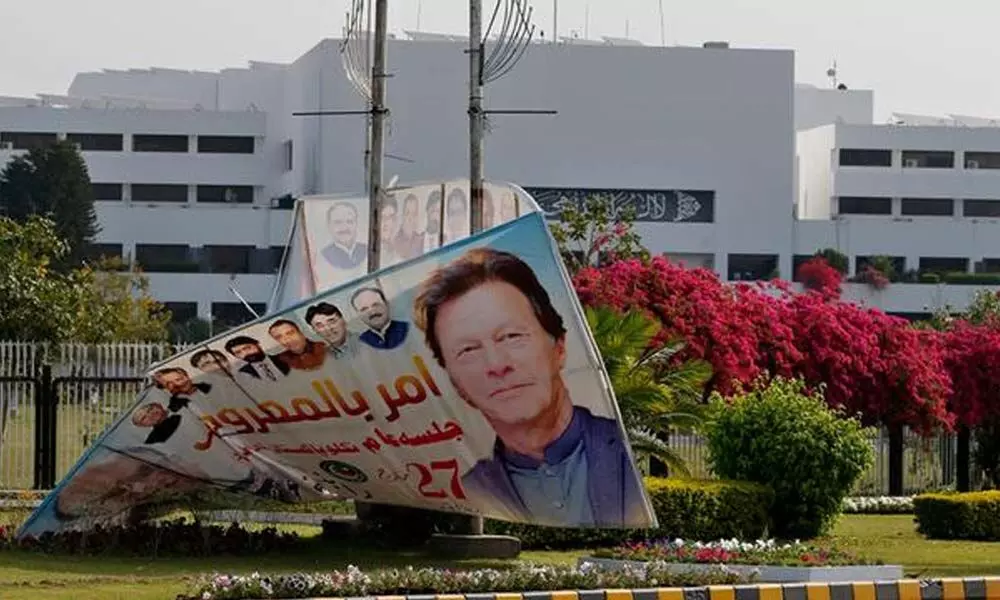Trust vote in Pakistan - constitutional issues

Trust vote in Pakistan - constitutional issues
Sunday was a day of tumult for South Asia, with major political developments in Pakistan and Sri Lanka.
Sunday was a day of tumult for South Asia, with major political developments in Pakistan and Sri Lanka. While the resignation of 26 cabinet ministers of Sri Lanka was prompted by the economic crisis in the country, the crisis in Pakistan is a political one, and now also a constitutional one.
Since independence, no Prime Minister of Pakistan has been able to complete a term of five years. Imran Khan, who became the Prime Minister in August 2018 had completed only a little more than three and a half years in office.
The genesis of the current crisis was the requisition filed by the united opposition front for a no-confidence motion on March 8. This no-confidence motion looked ominous for the government as many of the ruling party members no longer supported the Prime Minister but instead sided with the opposition, and some parties which were hitherto allies of the ruling party withdrew their support.
While the speaker of the Pakistan Assembly failed to hold the session within 14 days, the executive government preferred a presidential reference to the Supreme Court of Pakistan under Article 186 of the Constitution of Pakistan, seeking interpretation of Article 63A which makes provisions against defection of members of National Assembly, from one political party to another.
On the scheduled day for the no-confidence motion, the deputy speaker Qasim Shah Suri rejected the motion as being unconstitutional. He relied upon Article 5 of the Constitution, which mandates loyalty to the state. While the Supreme Court of Pakistan will ultimately take a view on this, it would seem far fetched to construe an official motion of no-confidence, well within the parliamentary rules, as an act of disloyalty against the state.
Even if the preceding events demonstrate disloyalty to a leader or a political party, it could not amount to an act against the state. Though there was a vague hint at a "foreign power" seeking to topple the government, it was neither explained nor substantiated.
Legal experts of Pakistan have widely criticised the dismissal of the no confidence motion going so far as to say that the act of the deputy speaker was no mere misinterpretation of the provisions of the constitution but a mala fide act that deliberately subverts the constitution.
Immediately after the dismissal of the no confidence motion, the Prime Minister advised the president to dissolve the Assembly.
It is a norm in all parliamentary democracies that when a motion for no confidence has not been voted upon, no other business can be transacted. Article 58 of the Pakistan Constitution incorporates this principle to situations like the current conundrum and specifically provides that while a Prime Minister would have the right to dissolve the National Assembly, such right would not be available when a motion for no confidence has been moved and not voted upon.
Analogy has been drawn to the case of Anwar Durrani who successfully petitioned the Balochistan High Court for the restoration of the Balochistan Assembly after it had been dissolved in similar circumstances, i.e., with a no-confidence motion not having been put to vote.
Another principle commonly seen in parliamentary democracies, where the proceedings in parliament are kept outside the purview of the courts is also incorporated in the Constitution of Pakistan in Article 69, and will no doubt be relied upon heavily by the lawyers for Imran Khan when the Supreme Court considers the issue.
However, in a twist of fate, it is in the case filed by Imran Khan against Nawaz Sharif that the Supreme Court had previously held that the protection from judicial scrutiny was only for procedural irregularities and not illegalities or factual inaccuracies.
Given the history of Pakistan, such a constitutional crisis is keenly observed across the world with some amount of trepidation. Instability, or weakness in the civilian administration has often resulted in Pakistan regressing into military rule. Collapse of constitutional government in Pakistan would not be good for the region or for the world.
(Vikram Hegde is an Advocate on Record. He is a gold medallist from the National Law School of India University, Bengaluru)














